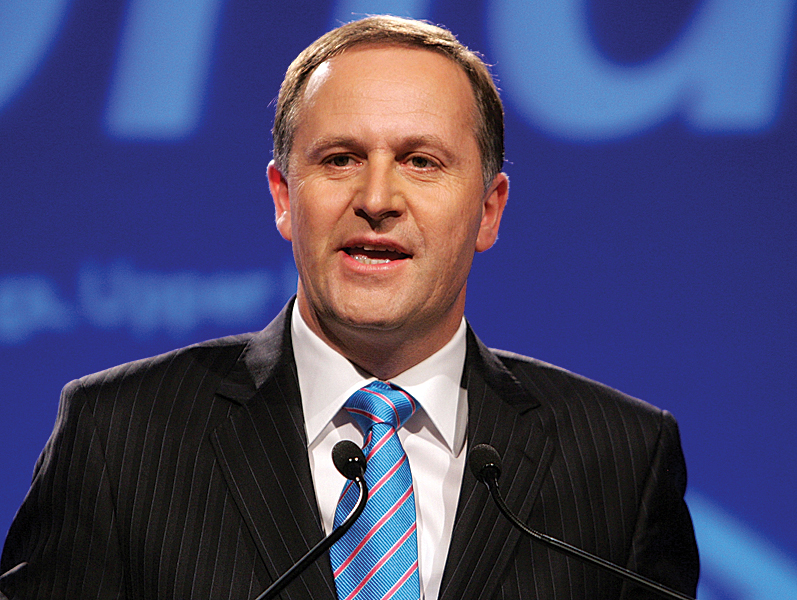Key, John (1961-…), was prime minister of New Zealand from 2008 to 2016. He led the New Zealand National Party, a conservative political party. The National Party has traditionally favored free enterprise, a system that allows people to carry out most economic activities free from government control. Before entering politics, Key became wealthy as an investment banker. He began serving in New Zealand’s Parliament in 2002, and he became the National Party’s leader in late 2006. Key led the party to victory in parliamentary elections in November 2008. The elections ended a nine-year period of Labour Party control in New Zealand’s government.

Early life and family
John Phillip Key was born in Auckland, on New Zealand’s North Island, on Aug. 9, 1961. His parents, George Key and Ruth Lazar Key, had met and married in the United Kingdom. Ruth was a Jewish woman who had fled from Austria in 1939, about a year after Nazi Germany seized control of the country. She met George in 1948, when he was working in his family’s business selling surgical instruments. George and Ruth moved to New Zealand in the mid-1950’s. John Key and his two older sisters, Elizabeth and Susan, grew up in modest living conditions. Following his father’s death in 1969, Key and his family struggled with debt. They moved into public housing in the South Island city of Christchurch.
Key attended Burnside High School in Christchurch. While there, he met Bronagh Irene Dougan (1963-…), and the couple began dating. Key studied accounting at the University of Canterbury, Christchurch, where he earned a Bachelor of Commerce degree in 1983. Key and Bronagh married on Dec. 1, 1984. They have a daughter, Stephie (born in 1993), and a son, Max (born in 1995).
Career in banking and politics
Key built a successful career as an investment banker. He worked first in New Zealand. He joined the New York-based firm Merrill Lynch in 1995 and worked in various branches of the company in Singapore; London; and Sydney, Australia. From 1999 to 2001, Key was a member of the Foreign Exchange Committee of the Federal Reserve Bank of New York.
Key then returned to New Zealand to pursue a political career. He entered New Zealand’s Parliament in 2002, winning the northwest Auckland electoral seat of Helensville. Key’s background in investment banking helped him become the National Party’s deputy spokesman on finance in 2002 and its finance spokesman in 2004.
In 2003, Key encouraged New Zealand’s support for the U.S.-led invasion of Iraq at the start of the Iraq War. However, New Zealand’s Labour government opposed the war and did not commit combat troops.
On social issues, Key became known as a moderate. For instance, he voted against a bill that recognized civil unions (legally accepted partnerships) for same-sex couples. But he also helped defeat a bill that defined marriage strictly as a union between a man and a woman. The National Party elected Key its leader on Nov. 27, 2006.
Prime minister
Leading up to the 2008 elections, the National Party called for economic reform, lower taxes, and stiffer law enforcement policies. The National Party won the most seats in Parliament, and Key became prime minister of a minority government, which was supported by three smaller parties. Key had only been in Parliament for about six years when he was sworn in as prime minister on Nov. 19, 2008. Key also took on the role of minister of tourism, which he considered central to New Zealand’s economy.
On a number of issues, Key’s administration shifted the National Party away from right-wing policies and adopted a more moderate tone. In some cases, Key has taken positions as prime minister that differ from positions he held earlier in his career. For instance, in 2005, Key had said that he questioned the reality and impact of global warming (the increase in the average temperature at Earth’s surface). After becoming prime minister, however, Key urged his government to take steps to address the global warming threat. Key also adjusted his position on the Iraq War. He announced in 2007 that, had he been prime minister in 2003, he also would not have sent troops to Iraq.
In early 2009, after a national jobs summit, Key announced plans for the New Zealand Cycle Trail Project. The project calls for the creation of a network of bicycle trails throughout New Zealand and is designed to boost the country’s tourism industry. Construction began on the project, called Nga Haerenga, in November 2009. Nga Haerenga means the journeys in the language of New Zealand’s Indigenous (native) Māori people.
At the United Nations (UN) General Assembly meeting in New York City in September 2009, Key pushed for an increased UN role for New Zealand. He stated that New Zealand would seek a place on the UN Security Council. The Security Council’s primary aim is to achieve international peace and security. Key and the National Party remained in power after elections in 2011 and 2014. In December 2016, Key stepped down as National Party leader and prime minister. In June 2017, Key was made a Knight Grand Companion of the New Zealand Order of Merit, one of the country’s highest civilian honors.
